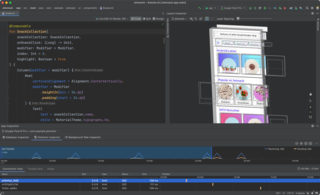
The Document Object Model (DOM) is a cross-platform and language-independent interface that treats an HTML or XML document as a tree structure wherein each node is an object representing a part of the document. The DOM represents a document with a logical tree. Each branch of the tree ends in a node, and each node contains objects. DOM methods allow programmatic access to the tree; with them one can change the structure, style or content of a document. Nodes can have event handlers attached to them. Once an event is triggered, the event handlers get executed.

JavaScript, often abbreviated as JS, is a programming language that is one of the core technologies of the World Wide Web, alongside HTML and CSS. As of 2023, 98.7% of websites use JavaScript on the client side for webpage behavior, often incorporating third-party libraries. All major web browsers have a dedicated JavaScript engine to execute the code on users' devices.
Gecko is a browser engine developed by Mozilla. It is used in the Firefox browser, the Thunderbird email client, and many other projects.
This is a comparison of both historical and current web browsers based on developer, engine, platform(s), releases, license, and cost.
Free Java implementations are software projects that implement Oracle's Java technologies and are distributed under free software licences, making them free software. Sun released most of its Java source code as free software in May 2007, so it can now almost be considered a free Java implementation. Java implementations include compilers, runtimes, class libraries, etc. Advocates of free and open source software refer to free or open source Java virtual machine software as free runtimes or free Java runtimes.

jMonkeyEngine is an open-source and cross-platform game engine for developing 3D games written in Java. It uses shader technology extensively and can be used to write games for Windows, Linux, macOS, Raspberry Pi, Android, and iOS. It uses Lightweight Java Game Library as its default renderer and another renderer based on Java OpenGL. it also supports OpenGL 2 to OpenGL 4.

NetSurf is an open-source web browser which uses its own layout engine. Its design goal is to be lightweight and portable. NetSurf provides features including tabbed browsing, bookmarks and page thumbnailing.
The Prototype JavaScript Framework is a JavaScript framework created by Sam Stephenson in February 2005 as part of Ajax support in Ruby on Rails. It is implemented as a single file of JavaScript code, usually named prototype.js. Prototype is distributed standalone, but also as part of larger projects, such as Ruby on Rails, script.aculo.us and Rico. As of March 2021, according to w3techs, Prototype is used by 0.6% of all websites.
jQuery is a JavaScript library designed to simplify HTML DOM tree traversal and manipulation, as well as event handling, CSS animation, and Ajax. It is free, open-source software using the permissive MIT License. As of Aug 2022, jQuery is used by 77% of the 10 million most popular websites. Web analysis indicates that it is the most widely deployed JavaScript library by a large margin, having at least 3 to 4 times more usage than any other JavaScript library.
The Java language has undergone several changes since JDK 1.0 as well as numerous additions of classes and packages to the standard library. Since J2SE 1.4, the evolution of the Java language has been governed by the Java Community Process (JCP), which uses Java Specification Requests (JSRs) to propose and specify additions and changes to the Java platform. The language is specified by the Java Language Specification (JLS); changes to the JLS are managed under JSR 901. In September 2017, Mark Reinhold, chief Architect of the Java Platform, proposed to change the release train to "one feature release every six months" rather than the then-current two-year schedule. This proposal took effect for all following versions, and is still the current release schedule.

Ext JS is a JavaScript application framework for building interactive cross-platform web applications using techniques such as Ajax, DHTML and DOM scripting. It can be used as a simple component framework but also as a full framework for building single-page applications (SPAs).
Svelte is a free and open-source front-end component framework and language created by Rich Harris and maintained by the Svelte core team members. Svelte is not a monolithic JavaScript library imported by applications: instead, Svelte compiles HTML templates to specialized code that manipulates the DOM directly, which may reduce the size of transferred files and give better client performance. Application code is also processed by the compiler, inserting calls to automatically recompute data and re-render UI elements when the data they depend on is modified. This also avoids the overhead associated with runtime intermediate representations, such as virtual DOM, unlike traditional frameworks which carry out the bulk of their work at runtime, i.e. in the browser.

Simple Logging Facade for Java (SLF4J) provides a Java logging API by means of a simple facade pattern. The underlying logging backend is determined at runtime by adding the desired binding to the classpath and may be the standard Sun Java logging package java.util.logging, Log4j, Reload4j, Logback or tinylog.
Oracle iPlanet Web Server (OiWS) is a web server designed for medium and large business applications. Previous versions were marketed as Netscape Enterprise Server, iPlanet Web Server, Sun ONE Web Server, and Sun Java System Web Server.
AngularJS is a discontinued free and open-source JavaScript-based web framework for developing single-page applications. It was maintained mainly by Google and a community of individuals and corporations. It aimed to simplify both the development and the testing of such applications by providing a framework for client-side model–view–controller (MVC) and model–view–viewmodel (MVVM) architectures, along with components commonly used in web applications and progressive web applications.

Android Studio is the official integrated development environment (IDE) for Google's Android operating system, built on JetBrains' IntelliJ IDEA software and designed specifically for Android development. It is available for download on Windows, macOS and Linux based operating systems. It is a replacement for the Eclipse Android Development Tools (E-ADT) as the primary IDE for native Android application development.
Kotlin is a cross-platform, statically typed, general-purpose high-level programming language with type inference. Kotlin is designed to interoperate fully with Java, and the JVM version of Kotlin's standard library depends on the Java Class Library, but type inference allows its syntax to be more concise. Kotlin mainly targets the JVM, but also compiles to JavaScript or native code via LLVM. Language development costs are borne by JetBrains, while the Kotlin Foundation protects the Kotlin trademark.

React is a free and open-source front-end JavaScript library for building user interfaces based on components. It is maintained by Meta and a community of individual developers and companies.

Electron is a free and open-source software framework developed and maintained by OpenJS Foundation. The framework is designed to create desktop applications using web technologies that are rendered using a version of the Chromium browser engine and a back end using the Node.js runtime environment. It also uses various APIs to enable functionality such as native integration with Node.js services and an inter-process communication module.

Vue.js is an open-source model–view–viewmodel front end JavaScript library for building user interfaces and single-page applications. It was created by Evan You, and is maintained by him and the rest of the active core team members.








